Replicating the unique functionality of egg whites, like foaming, binding, and gelling, has long been a critical challenge for the alternative protein industry. Their traditional production comes with steep trade-offs, requiring large amounts of water, land, and feed for chickens, and have Carbon emissions ~2,600 kg CO2-eq per cycle, with chicken feed contributing the majority.
A young Swiss foodtech start-up, Yeastup, addresses this challenge using a largely untapped resource, a by-product of beer production, with 10,000 tons produced daily worldwide. They transform this byproduct into a plant-based protein alternative that replicates the qualities of egg whites, offering a sustainable and innovative solution for the food industry.
GreyB connected with Urs Briner, co-founder of Yeastup, to analyze the feasibility and scalability of their innovation. In this exclusive discussion, Urs shares how Yeastup’s solutions address the scalability of egg protein alternative and pave the way for a sustainable and efficient protein production.
This interview is part of GreyB’s Scouted series. In this series, we spotlight innovative startups and speak to their founders about how their solutions can be implemented to solve critical challenges and comply with industry and sustainability regulations. You can find all those interviews here.
We want to create ingredients that meet today’s needs and align with future generations’ values—sustainability, health, and innovation.
– Urs Briner

Urs Briner oversees strategy, financing, and the management of complex B2B contracts. Prior to this role, Urs held a senior leadership position at IBM as General Manager of the consulting division in Europe, where he managed multi-billion-dollar operations and led a team of over 30,000 professionals. His experience at IBM has equipped him with a strong foundation in business strategy and operational scaling, which he brings to his current role at Yeastup.
Watch the complete conversation with Yeastup.
Overview: Upcycling beer by-products into sustainable egg protein alternative
YeastUp transforms brewer’s spent yeast, a byproduct of beer production typically relegated to low-value animal feed, into high-value food ingredients. Through an innovative extraction process, they isolate protein, beta-glucan, and mannan, creating sustainable alternatives to traditional ingredients in the food industry.
Their protein, with a PDCAAS of 1, is a vegan substitute for egg whites and collagen peptides, making it ideal for baking, sports nutrition, and alternative meats. The extracted fibers offer natural binding and water-retention properties, reducing reliance on synthetic additives.
Highlights from the conversation
How would you explain Yeastup’s work and its significance in layman’s terms for those unfamiliar with the industry?
Urs: At YeastUp, we take leftover yeast from beer production and turn it into valuable food ingredients. This yeast is typically sent to animal feed, but we’ve developed a process to upcycle it into something more beneficial. It is rich in protein and fibers, and we’ve created a method to extract these nutrients. We produce protein that serves as a vegan alternative to egg whites or collagen, while the fibers support gut health and enhance food functionality, such as retaining moisture in plant-based meats.
What we’re really doing is taking a material that would otherwise go to waste and turning it into something useful for people and better for the planet. It’s about creating sustainable solutions that meet the growing demand for healthier, alternative food ingredients.
Yeast-based proteins often have a strong umami and bitter taste. How have you managed to achieve a taste-neutral protein?
Urs: We’ve developed a specific process to ensure our protein is taste-neutral, overcoming the strong umami and bitterness typically associated with yeast-based proteins. When the spent yeast arrives at our facility, we wash it intensively using a proprietary method that removes the bitterness while preserving the functional properties of the protein.
This results in a protein that has no detectable yeast flavor, making it versatile for various food applications. In fact, during testing with one of the world’s leading flavor companies, our protein was used in multiple products, and its neutral taste blended seamlessly across all applications. This taste neutrality allows our protein to meet the demands of diverse industries without compromising on flavor.
Given your specific sourcing requirements, are there challenges in securing a consistent supply of food-grade active yeast?
Urs: Thanks to how we’ve structured our sourcing process, we haven’t faced significant challenges in securing a consistent supply of food-grade active yeast. We exclusively partner with breweries that treat their yeast to food-grade standards, keeping it cooled, stirred, and sealed in tanks before delivering it to us. This helps maintain the quality we need for our process.
Additionally, the breweries are strongly motivated to work with us. By partnering with Yeastup, they receive higher value for their spent yeast than selling it as animal feed. They also benefit from reduced CO₂ emissions and improved sustainability credentials, which align with their environmental goals. With these mutual benefits in place, we’ve established a reliable and scalable supply chain.
What are the key challenges Yeastup faces in scaling operations, and what strategies have you implemented to address them?
Urs: Scaling operations at Yeastup involves challenges like maintaining consistent product quality and managing capital expenditure efficiently. Ensuring high-quality ingredients is essential for customer trust while avoiding excessive equity dilution, which makes large-scale investments difficult.
To overcome these challenges, we’ve adopted a ‘capex-light’ strategy by repurposing facilities like a former dairy plant. This approach reduces setup costs and accelerates production timelines. This approach allows us to scale sustainably while minimizing investments. We’re also exploring partnerships with underutilized facilities across Europe to expand capacity further while maintaining quality and efficiency.
How does Yeastup protect its intellectual property, and what combination of patents and trade secrets ensure your process remains secure?
Urs: We use a multi-faceted approach to protect our intellectual property, combining patents and trade secrets to safeguard our process. Our patents, covering 16 critical steps of the extraction process, have all been approved. We localized these patents in key beer-brewing regions worldwide to ensure broad protection. This strategy targets the markets where we source our raw materials.
In addition to patents, we rely on trade secrets to protect our process’s most sensitive and proprietary aspects. We do not disclose certain critical steps, such as how we inactivate yeast while preserving protein functionality, in the patents. This dual approach protects our innovations legally while keeping the core of our competitive edge confidential and secure. This combination allows us to maintain transparency where necessary and secrecy where it matters most.
Meet our Interviewer – Shabaz Khan, Marketing Manager at GreyB
Shabaz Khan, a seasoned marketing manager at GreyB, leads the Scouted By GreyB campaign. With a decade of experience, he specializes in delivering critical insights to Innovation leaders, R&D, and IP teams about evolving tech landscapes, innovation trends, and emerging breakthrough startups. Shabaz excels at aligning research data with business needs and developing strategies to solve innovation challenges. His leadership and problem-solving skills make him a valuable asset in R&D and IP research.
To learn more about this startup and validate the effectiveness of its technologies, contact our scouting expert using the form below or explore GreyB’s startup scouting services.
hbspt.forms.create({ region: “na1”, portalId: “1791848”, formId: “03d7a1b1-db99-4943-82b5-57c3706c9e1b” });Authored By – Ridhima Mahajan, Marketing


